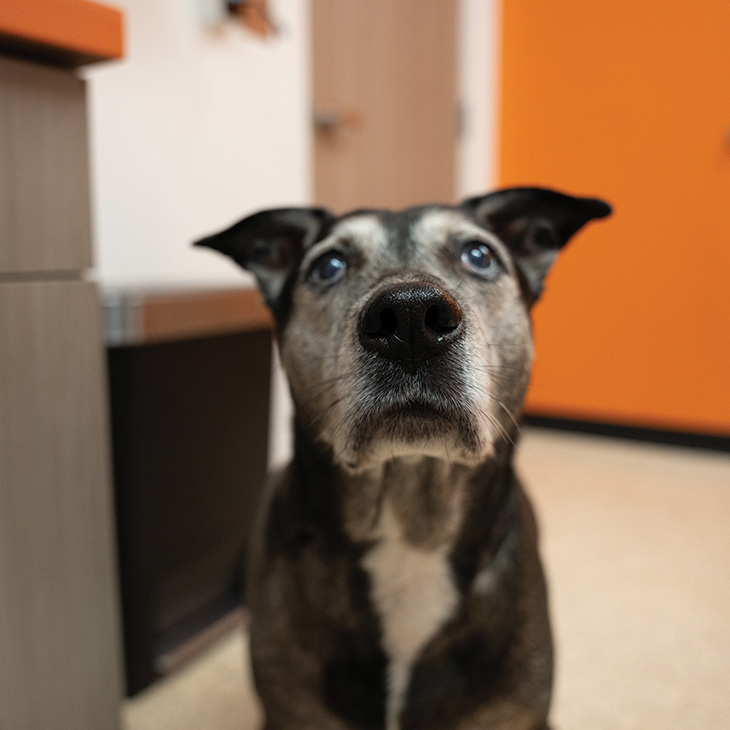Monday, December 1, 2025
Media Contact:
Kinsey Reed | Communications Coordinator | 405-744-6740 | cvmcommunications@okstate.edu
Pico, a 13-year-old Catahoula mix, found his energy again after a life-changing surgery.
For about five years, Pico has suffered from multiple masses on his body. What started
out small grew to become detrimental to Pico’s day-to-day life.
“Our veterinarian at the time was not comfortable performing the surgery due to the
number of blood vessels surrounding the masses,” said Christina Buntin, Pico’s owner.
“We left them alone, assuming that since he was already an older dog, they wouldn’t
cause too much of an issue.”
After the bigger mass on Pico’s shoulder grew to a grueling 5.5 pounds, Buntin decided
to bring him to the Oklahoma State University Veterinary Medical Teaching Hospital.
“Pico came in with two large masses, one on the right hind leg and one on the right
shoulder,” said Dr. David Bailey, small animal primary care clinical assistant professor.
“These masses were causing him discomfort and interfering with his ability to walk.”
During the initial exam, the primary care team collected fine-needle aspirates from
both tumors.
Cytology showed the shoulder mass was a lipoma, a benign fatty tumor, while results
for the hind leg mass were inconclusive. Chest radiographs confirmed the patient’s
heart and lungs were healthy for anesthesia and revealed the shoulder mass was located
on top of the scapula rather than beneath it, making removal less complicated.
 Pico, a 13-year-old Catahoula mix, had tumors removed at the OSU Veterinary Medical
Pico, a 13-year-old Catahoula mix, had tumors removed at the OSU Veterinary Medical
Teaching Hospital.
“Once we determined that the masses were unlikely to be malignant, we chose to remove
the tumors in the hope of improving Pico’s mobility,” Bailey said.
Both tumors were removed and sent for histopathology, which confirmed the shoulder
mass was a lipoma and the hind leg mass was a hamartoma, another benign tumor.
“The surgery was particularly challenging due to the large size of the right-side
mass and the significant blood supply feeding both tumors,” Bailey said.
Pico returned home the day of his surgery and did not require hospitalization.
“He recovered from surgery with no complications,” Bailey said. “When he came in for
his incision recheck, he was moving much better, especially in the front legs, but
was still having some mobility issues in his hind legs due to chronic arthritis.”
The primary care team implemented an arthritis pain management plan to improve Pico’s
comfort and mobility and will continue follow-up care as needed.
“The most rewarding part of the case was knowing we could give Pico more quality time
with his loved ones,” said Madi Purdy, fourth-year veterinary student.
Buntin said Pico seems like a completely different dog now.
“He is hyper and wants to play tug of war, which is his favorite activity,” Buntin
said. “Before, that was pretty much impossible with the size of that lipoma.”
Buntin commended both the staff and Dr. Bailey for their care and professionalism.
“Everybody at the hospital was so nice and sweet,” Buntin said. “The student on Pico’s
case even called to check on him before and after surgery, which was very comforting.
It showed she truly cared about what she was doing.”
Buntin also appreciated Dr. Bailey’s approach.
“He was very nice, straightforward, informative and confident,” she said. “The way
he talked to me — and to the students — gave me confidence that they could do the
job well.”
Purdy, the student assigned to Pico’s case, said the experience was equally meaningful.
“The most rewarding part of the case was knowing we could give Pico more quality time
with his loved ones.”
— Madi Purdy, fourth-year veterinary student
“I was able to gain valuable surgical experience with an outstanding mentor, Dr. Bailey,
whose calm and clear communication guided me through my portion of the procedure,”
she said.
The case also gave other veterinary students a rare chance to witness the removal
of such a large lipoma, turning Pico’s surgery into both a learning experience and
a lifesaving procedure.
“By removing the mass, we not only made it easier for him to get around but also extended
his life,” Purdy said. “He went home with his loving family walking easier, feeling
lighter and with a new lease on life.”
Photo By: Bailey Horn
Story By: Bailey Horn | Vet Cetera Magazine
